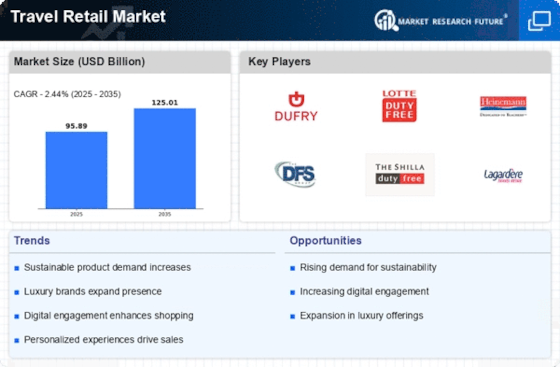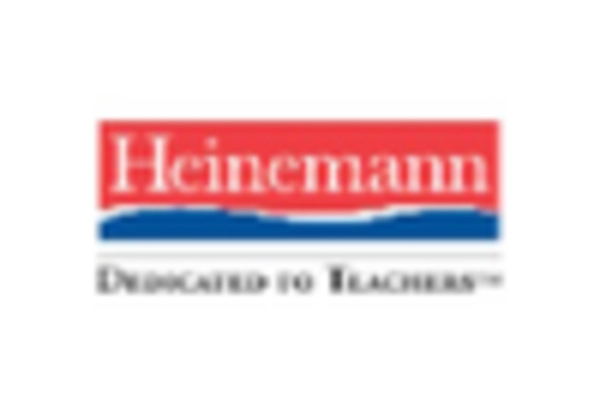- Travel Retail Market By Product Category (USD Billion, 2019-2035)
- Cosmetics
- Alcoholic Beverages
- Confectionery
- Tobacco
- Fashion Accessories
- Travel Retail Market By Sales Channel (USD Billion, 2019-2035)
- Airports
- Cruise Ships
- Railway Stations
- Borders
- Duty-Free Shops
- Travel Retail Market By Customer Type (USD Billion, 2019-2035)
- Leisure Travelers
- Business Travelers
- Frequent Flyers
- Family Travelers
- Travel Retail Market By Packaging Type (USD Billion, 2019-2035)
- Single-Use Packaging
- Multi-Pack Packaging
- Gift Sets
- Bulk Packaging
- Travel Retail Market By Regional (USD Billion, 2019-2035)
- North America
- Europe
- South America
- Asia Pacific
- Middle East and Africa
North America Outlook (USD Billion, 2019-2035)
North America Travel Retail Market by Product Category Type
Cosmetics
Alcoholic Beverages
Confectionery
Tobacco
Fashion Accessories
North America Travel Retail Market by Sales Channel Type
Airports
Cruise Ships
Railway Stations
Borders
Duty-Free Shops
North America Travel Retail Market by Customer Type
Leisure Travelers
Business Travelers
Frequent Flyers
Family Travelers
North America Travel Retail Market by Packaging Type
Single-Use Packaging
Multi-Pack Packaging
Gift Sets
Bulk Packaging
North America Travel Retail Market by Regional Type
US
Canada
US Outlook (USD Billion, 2019-2035)
US Travel Retail Market by Product Category Type
Cosmetics
Alcoholic Beverages
Confectionery
Tobacco
Fashion Accessories
US Travel Retail Market by Sales Channel Type
Airports
Cruise Ships
Railway Stations
Borders
Duty-Free Shops
US Travel Retail Market by Customer Type
Leisure Travelers
Business Travelers
Frequent Flyers
Family Travelers
US Travel Retail Market by Packaging Type
Single-Use Packaging
Multi-Pack Packaging
Gift Sets
Bulk Packaging
CANADA Outlook (USD Billion, 2019-2035)
CANADA Travel Retail Market by Product Category Type
Cosmetics
Alcoholic Beverages
Confectionery
Tobacco
Fashion Accessories
CANADA Travel Retail Market by Sales Channel Type
Airports
Cruise Ships
Railway Stations
Borders
Duty-Free Shops
CANADA Travel Retail Market by Customer Type
Leisure Travelers
Business Travelers
Frequent Flyers
Family Travelers
CANADA Travel Retail Market by Packaging Type
Single-Use Packaging
Multi-Pack Packaging
Gift Sets
Bulk Packaging
Europe Outlook (USD Billion, 2019-2035)
Europe Travel Retail Market by Product Category Type
Cosmetics
Alcoholic Beverages
Confectionery
Tobacco
Fashion Accessories
Europe Travel Retail Market by Sales Channel Type
Airports
Cruise Ships
Railway Stations
Borders
Duty-Free Shops
Europe Travel Retail Market by Customer Type
Leisure Travelers
Business Travelers
Frequent Flyers
Family Travelers
Europe Travel Retail Market by Packaging Type
Single-Use Packaging
Multi-Pack Packaging
Gift Sets
Bulk Packaging
Europe Travel Retail Market by Regional Type
Germany
UK
France
Russia
Italy
Spain
Rest of Europe
GERMANY Outlook (USD Billion, 2019-2035)
GERMANY Travel Retail Market by Product Category Type
Cosmetics
Alcoholic Beverages
Confectionery
Tobacco
Fashion Accessories
GERMANY Travel Retail Market by Sales Channel Type
Airports
Cruise Ships
Railway Stations
Borders
Duty-Free Shops
GERMANY Travel Retail Market by Customer Type
Leisure Travelers
Business Travelers
Frequent Flyers
Family Travelers
GERMANY Travel Retail Market by Packaging Type
Single-Use Packaging
Multi-Pack Packaging
Gift Sets
Bulk Packaging
UK Outlook (USD Billion, 2019-2035)
UK Travel Retail Market by Product Category Type
Cosmetics
Alcoholic Beverages
Confectionery
Tobacco
Fashion Accessories
UK Travel Retail Market by Sales Channel Type
Airports
Cruise Ships
Railway Stations
Borders
Duty-Free Shops
UK Travel Retail Market by Customer Type
Leisure Travelers
Business Travelers
Frequent Flyers
Family Travelers
UK Travel Retail Market by Packaging Type
Single-Use Packaging
Multi-Pack Packaging
Gift Sets
Bulk Packaging
FRANCE Outlook (USD Billion, 2019-2035)
FRANCE Travel Retail Market by Product Category Type
Cosmetics
Alcoholic Beverages
Confectionery
Tobacco
Fashion Accessories
FRANCE Travel Retail Market by Sales Channel Type
Airports
Cruise Ships
Railway Stations
Borders
Duty-Free Shops
FRANCE Travel Retail Market by Customer Type
Leisure Travelers
Business Travelers
Frequent Flyers
Family Travelers
FRANCE Travel Retail Market by Packaging Type
Single-Use Packaging
Multi-Pack Packaging
Gift Sets
Bulk Packaging
RUSSIA Outlook (USD Billion, 2019-2035)
RUSSIA Travel Retail Market by Product Category Type
Cosmetics
Alcoholic Beverages
Confectionery
Tobacco
Fashion Accessories
RUSSIA Travel Retail Market by Sales Channel Type
Airports
Cruise Ships
Railway Stations
Borders
Duty-Free Shops
RUSSIA Travel Retail Market by Customer Type
Leisure Travelers
Business Travelers
Frequent Flyers
Family Travelers
RUSSIA Travel Retail Market by Packaging Type
Single-Use Packaging
Multi-Pack Packaging
Gift Sets
Bulk Packaging
ITALY Outlook (USD Billion, 2019-2035)
ITALY Travel Retail Market by Product Category Type
Cosmetics
Alcoholic Beverages
Confectionery
Tobacco
Fashion Accessories
ITALY Travel Retail Market by Sales Channel Type
Airports
Cruise Ships
Railway Stations
Borders
Duty-Free Shops
ITALY Travel Retail Market by Customer Type
Leisure Travelers
Business Travelers
Frequent Flyers
Family Travelers
ITALY Travel Retail Market by Packaging Type
Single-Use Packaging
Multi-Pack Packaging
Gift Sets
Bulk Packaging
SPAIN Outlook (USD Billion, 2019-2035)
SPAIN Travel Retail Market by Product Category Type
Cosmetics
Alcoholic Beverages
Confectionery
Tobacco
Fashion Accessories
SPAIN Travel Retail Market by Sales Channel Type
Airports
Cruise Ships
Railway Stations
Borders
Duty-Free Shops
SPAIN Travel Retail Market by Customer Type
Leisure Travelers
Business Travelers
Frequent Flyers
Family Travelers
SPAIN Travel Retail Market by Packaging Type
Single-Use Packaging
Multi-Pack Packaging
Gift Sets
Bulk Packaging
REST OF EUROPE Outlook (USD Billion, 2019-2035)
REST OF EUROPE Travel Retail Market by Product Category Type
Cosmetics
Alcoholic Beverages
Confectionery
Tobacco
Fashion Accessories
REST OF EUROPE Travel Retail Market by Sales Channel Type
Airports
Cruise Ships
Railway Stations
Borders
Duty-Free Shops
REST OF EUROPE Travel Retail Market by Customer Type
Leisure Travelers
Business Travelers
Frequent Flyers
Family Travelers
REST OF EUROPE Travel Retail Market by Packaging Type
Single-Use Packaging
Multi-Pack Packaging
Gift Sets
Bulk Packaging
APAC Outlook (USD Billion, 2019-2035)
APAC Travel Retail Market by Product Category Type
Cosmetics
Alcoholic Beverages
Confectionery
Tobacco
Fashion Accessories
APAC Travel Retail Market by Sales Channel Type
Airports
Cruise Ships
Railway Stations
Borders
Duty-Free Shops
APAC Travel Retail Market by Customer Type
Leisure Travelers
Business Travelers
Frequent Flyers
Family Travelers
APAC Travel Retail Market by Packaging Type
Single-Use Packaging
Multi-Pack Packaging
Gift Sets
Bulk Packaging
APAC Travel Retail Market by Regional Type
China
India
Japan
South Korea
Malaysia
Thailand
Indonesia
Rest of APAC
CHINA Outlook (USD Billion, 2019-2035)
CHINA Travel Retail Market by Product Category Type
Cosmetics
Alcoholic Beverages
Confectionery
Tobacco
Fashion Accessories
CHINA Travel Retail Market by Sales Channel Type
Airports
Cruise Ships
Railway Stations
Borders
Duty-Free Shops
CHINA Travel Retail Market by Customer Type
Leisure Travelers
Business Travelers
Frequent Flyers
Family Travelers
CHINA Travel Retail Market by Packaging Type
Single-Use Packaging
Multi-Pack Packaging
Gift Sets
Bulk Packaging
INDIA Outlook (USD Billion, 2019-2035)
INDIA Travel Retail Market by Product Category Type
Cosmetics
Alcoholic Beverages
Confectionery
Tobacco
Fashion Accessories
INDIA Travel Retail Market by Sales Channel Type
Airports
Cruise Ships
Railway Stations
Borders
Duty-Free Shops
INDIA Travel Retail Market by Customer Type
Leisure Travelers
Business Travelers
Frequent Flyers
Family Travelers
INDIA Travel Retail Market by Packaging Type
Single-Use Packaging
Multi-Pack Packaging
Gift Sets
Bulk Packaging
JAPAN Outlook (USD Billion, 2019-2035)
JAPAN Travel Retail Market by Product Category Type
Cosmetics
Alcoholic Beverages
Confectionery
Tobacco
Fashion Accessories
JAPAN Travel Retail Market by Sales Channel Type
Airports
Cruise Ships
Railway Stations
Borders
Duty-Free Shops
JAPAN Travel Retail Market by Customer Type
Leisure Travelers
Business Travelers
Frequent Flyers
Family Travelers
JAPAN Travel Retail Market by Packaging Type
Single-Use Packaging
Multi-Pack Packaging
Gift Sets
Bulk Packaging
SOUTH KOREA Outlook (USD Billion, 2019-2035)
SOUTH KOREA Travel Retail Market by Product Category Type
Cosmetics
Alcoholic Beverages
Confectionery
Tobacco
Fashion Accessories
SOUTH KOREA Travel Retail Market by Sales Channel Type
Airports
Cruise Ships
Railway Stations
Borders
Duty-Free Shops
SOUTH KOREA Travel Retail Market by Customer Type
Leisure Travelers
Business Travelers
Frequent Flyers
Family Travelers
SOUTH KOREA Travel Retail Market by Packaging Type
Single-Use Packaging
Multi-Pack Packaging
Gift Sets
Bulk Packaging
MALAYSIA Outlook (USD Billion, 2019-2035)
MALAYSIA Travel Retail Market by Product Category Type
Cosmetics
Alcoholic Beverages
Confectionery
Tobacco
Fashion Accessories
MALAYSIA Travel Retail Market by Sales Channel Type
Airports
Cruise Ships
Railway Stations
Borders
Duty-Free Shops
MALAYSIA Travel Retail Market by Customer Type
Leisure Travelers
Business Travelers
Frequent Flyers
Family Travelers
MALAYSIA Travel Retail Market by Packaging Type
Single-Use Packaging
Multi-Pack Packaging
Gift Sets
Bulk Packaging
THAILAND Outlook (USD Billion, 2019-2035)
THAILAND Travel Retail Market by Product Category Type
Cosmetics
Alcoholic Beverages
Confectionery
Tobacco
Fashion Accessories
THAILAND Travel Retail Market by Sales Channel Type
Airports
Cruise Ships
Railway Stations
Borders
Duty-Free Shops
THAILAND Travel Retail Market by Customer Type
Leisure Travelers
Business Travelers
Frequent Flyers
Family Travelers
THAILAND Travel Retail Market by Packaging Type
Single-Use Packaging
Multi-Pack Packaging
Gift Sets
Bulk Packaging
INDONESIA Outlook (USD Billion, 2019-2035)
INDONESIA Travel Retail Market by Product Category Type
Cosmetics
Alcoholic Beverages
Confectionery
Tobacco
Fashion Accessories
INDONESIA Travel Retail Market by Sales Channel Type
Airports
Cruise Ships
Railway Stations
Borders
Duty-Free Shops
INDONESIA Travel Retail Market by Customer Type
Leisure Travelers
Business Travelers
Frequent Flyers
Family Travelers
INDONESIA Travel Retail Market by Packaging Type
Single-Use Packaging
Multi-Pack Packaging
Gift Sets
Bulk Packaging
REST OF APAC Outlook (USD Billion, 2019-2035)
REST OF APAC Travel Retail Market by Product Category Type
Cosmetics
Alcoholic Beverages
Confectionery
Tobacco
Fashion Accessories
REST OF APAC Travel Retail Market by Sales Channel Type
Airports
Cruise Ships
Railway Stations
Borders
Duty-Free Shops
REST OF APAC Travel Retail Market by Customer Type
Leisure Travelers
Business Travelers
Frequent Flyers
Family Travelers
REST OF APAC Travel Retail Market by Packaging Type
Single-Use Packaging
Multi-Pack Packaging
Gift Sets
Bulk Packaging
South America Outlook (USD Billion, 2019-2035)
South America Travel Retail Market by Product Category Type
Cosmetics
Alcoholic Beverages
Confectionery
Tobacco
Fashion Accessories
South America Travel Retail Market by Sales Channel Type
Airports
Cruise Ships
Railway Stations
Borders
Duty-Free Shops
South America Travel Retail Market by Customer Type
Leisure Travelers
Business Travelers
Frequent Flyers
Family Travelers
South America Travel Retail Market by Packaging Type
Single-Use Packaging
Multi-Pack Packaging
Gift Sets
Bulk Packaging
South America Travel Retail Market by Regional Type
Brazil
Mexico
Argentina
Rest of South America
BRAZIL Outlook (USD Billion, 2019-2035)
BRAZIL Travel Retail Market by Product Category Type
Cosmetics
Alcoholic Beverages
Confectionery
Tobacco
Fashion Accessories
BRAZIL Travel Retail Market by Sales Channel Type
Airports
Cruise Ships
Railway Stations
Borders
Duty-Free Shops
BRAZIL Travel Retail Market by Customer Type
Leisure Travelers
Business Travelers
Frequent Flyers
Family Travelers
BRAZIL Travel Retail Market by Packaging Type
Single-Use Packaging
Multi-Pack Packaging
Gift Sets
Bulk Packaging
MEXICO Outlook (USD Billion, 2019-2035)
MEXICO Travel Retail Market by Product Category Type
Cosmetics
Alcoholic Beverages
Confectionery
Tobacco
Fashion Accessories
MEXICO Travel Retail Market by Sales Channel Type
Airports
Cruise Ships
Railway Stations
Borders
Duty-Free Shops
MEXICO Travel Retail Market by Customer Type
Leisure Travelers
Business Travelers
Frequent Flyers
Family Travelers
MEXICO Travel Retail Market by Packaging Type
Single-Use Packaging
Multi-Pack Packaging
Gift Sets
Bulk Packaging
ARGENTINA Outlook (USD Billion, 2019-2035)
ARGENTINA Travel Retail Market by Product Category Type
Cosmetics
Alcoholic Beverages
Confectionery
Tobacco
Fashion Accessories
ARGENTINA Travel Retail Market by Sales Channel Type
Airports
Cruise Ships
Railway Stations
Borders
Duty-Free Shops
ARGENTINA Travel Retail Market by Customer Type
Leisure Travelers
Business Travelers
Frequent Flyers
Family Travelers
ARGENTINA Travel Retail Market by Packaging Type
Single-Use Packaging
Multi-Pack Packaging
Gift Sets
Bulk Packaging
REST OF SOUTH AMERICA Outlook (USD Billion, 2019-2035)
REST OF SOUTH AMERICA Travel Retail Market by Product Category Type
Cosmetics
Alcoholic Beverages
Confectionery
Tobacco
Fashion Accessories
REST OF SOUTH AMERICA Travel Retail Market by Sales Channel Type
Airports
Cruise Ships
Railway Stations
Borders
Duty-Free Shops
REST OF SOUTH AMERICA Travel Retail Market by Customer Type
Leisure Travelers
Business Travelers
Frequent Flyers
Family Travelers
REST OF SOUTH AMERICA Travel Retail Market by Packaging Type
Single-Use Packaging
Multi-Pack Packaging
Gift Sets
Bulk Packaging
MEA Outlook (USD Billion, 2019-2035)
MEA Travel Retail Market by Product Category Type
Cosmetics
Alcoholic Beverages
Confectionery
Tobacco
Fashion Accessories
MEA Travel Retail Market by Sales Channel Type
Airports
Cruise Ships
Railway Stations
Borders
Duty-Free Shops
MEA Travel Retail Market by Customer Type
Leisure Travelers
Business Travelers
Frequent Flyers
Family Travelers
MEA Travel Retail Market by Packaging Type
Single-Use Packaging
Multi-Pack Packaging
Gift Sets
Bulk Packaging
MEA Travel Retail Market by Regional Type
GCC Countries
South Africa
Rest of MEA
GCC COUNTRIES Outlook (USD Billion, 2019-2035)
GCC COUNTRIES Travel Retail Market by Product Category Type
Cosmetics
Alcoholic Beverages
Confectionery
Tobacco
Fashion Accessories
GCC COUNTRIES Travel Retail Market by Sales Channel Type
Airports
Cruise Ships
Railway Stations
Borders
Duty-Free Shops
GCC COUNTRIES Travel Retail Market by Customer Type
Leisure Travelers
Business Travelers
Frequent Flyers
Family Travelers
GCC COUNTRIES Travel Retail Market by Packaging Type
Single-Use Packaging
Multi-Pack Packaging
Gift Sets
Bulk Packaging
SOUTH AFRICA Outlook (USD Billion, 2019-2035)
SOUTH AFRICA Travel Retail Market by Product Category Type
Cosmetics
Alcoholic Beverages
Confectionery
Tobacco
Fashion Accessories
SOUTH AFRICA Travel Retail Market by Sales Channel Type
Airports
Cruise Ships
Railway Stations
Borders
Duty-Free Shops
SOUTH AFRICA Travel Retail Market by Customer Type
Leisure Travelers
Business Travelers
Frequent Flyers
Family Travelers
SOUTH AFRICA Travel Retail Market by Packaging Type
Single-Use Packaging
Multi-Pack Packaging
Gift Sets
Bulk Packaging
REST OF MEA Outlook (USD Billion, 2019-2035)
REST OF MEA Travel Retail Market by Product Category Type
Cosmetics
Alcoholic Beverages
Confectionery
Tobacco
Fashion Accessories
REST OF MEA Travel Retail Market by Sales Channel Type
Airports
Cruise Ships
Railway Stations
Borders
Duty-Free Shops
REST OF MEA Travel Retail Market by Customer Type
Leisure Travelers
Business Travelers
Frequent Flyers
Family Travelers
REST OF MEA Travel Retail Market by Packaging Type
Single-Use Packaging
Multi-Pack Packaging
Gift Sets
Bulk Packaging


















Leave a Comment